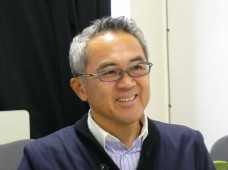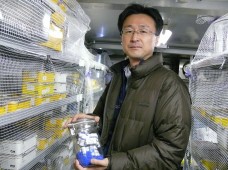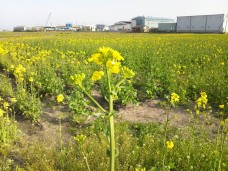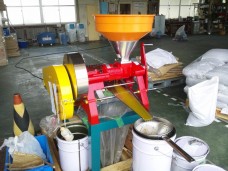2013.03.06
Interview with Tohoku University Vol. 2
Only one month after the earthquake and tsunami, Tohoku University established the Institute for Disaster Reconstruction and Regeneration Research and has been promoting cooperative projects ever since. In addition to this, university faculty and staff launched their own recovery assistance project called Reconstruction Action 100+. The second part of our interview focuses on Prof. Yutaka Nakai, Associate Dean of the Graduate School of Agricultural Science about the Rapeseed Project and Regional Biomass Recycling Project.
“Concepts detached from the reality are useless pie-in-the-sky ideas.” That was the first impression Prof. Nakai had when he visited the Faculty of Agriculture's field center located in the hard-hit town of Onagawa, Miyagi Prefecture immediately after the massive disaster in 2011.
On 23 March, just 10 days after the disaster, Prof. Nakai and a group of like-minded experts from a variety of disciplines, including agriculture, forestry, stock-breeding and marine studies, came together and the Tohoku University Graduate School of Agriculture launched the Agri-Reconstruction Project. Staff from the United Nations Information Center (UNIC Tokyo) went to Tohoku to investigate the Rapeseed Project for Restoring Tsunami-Salt-Damaged Farmland ("Rapeseed Project"), one of the reconstruction initiatives that experts in the fields of plant breeding, soil, cultivation, resource recycling and agricultural planning were working on, and spoke with the Project Leader Prof. Nakai. With the two-fold aim of helping rapeseed farmers recover and producing green energy, this project is supported by the Japan Science and Technology Agency (JST) and has been well received both at home and abroad.
The tsunami after the Great East Japan Earthquake left a massive scar on the region's farmland. In Miyagi Prefecture alone, 11% of farmland, including 2,700 ha (40%) of farmland in Sendai City, was damaged. While the university surveyed the extent of the damage in the city's rice paddies, Prof. Nakai reached a conclusion: "For the affected farmers to live here with pride and hope for the future, they will need to keep farming while efforts are made to recover farmland." Typically, recovering salt-damaged fields is an expensive process of either flushing salt from the soil or hauling in additional soil from elsewhere, but Prof. Nakai thought it would be better to use highly salt-resistant plants of the family Brassicaceae to enable the recovery of farmland optimized to the extent of damage. Thus began the Rapeseed Project.
There is also another reason the team chose rapeseed for the project: Tohoku University is home to the world's only gene bank that distributes Brassicaceae genes, which it has been collecting from around the world for over 50 years. In other words, this gene bank is a treasure trove of rapeseed strains.
"This is not just a project to solve the salt damage problem. It also aims to create a recycling-based society with an eye on energy production, food production and the resumption of farm activities", Prof. Nakai's eyes lit up as he spoke enthusiastically. More specifically, farmers will grow and sell edible rapeseed, from which oil will be extracted and converted into biodiesel (the collective name for alternative diesel fuel made from plant oils and waste cooking oil).
Working in cooperation with companies from Miyagi Prefecture and Sendai city as well as companies from Tokyo, the Rapeseed Project has blossomed into an industry-university partnership. Prof. Nakai has grand plans for the future: "For example, we can store the energy generated from the biomass that is the by-product of rapeseed oil production. Then we can build the electric vehicle (EV) stations to supply this energy to automobiles. There are no EV stations that use biomass yet, so I think Tohoku University should tackle this challenge."
Prof. Nakai added, "In the disaster-stricken Tohoku region, it is important that we seek to revitalize the community through the local production of biomass for local consumption. Because rejuvenating the region can help connect its people to each other." Prof. Nakai plans to hold presentations on these Tohoku projects overseas. In fact, there is an Indian researcher involved in the project who is conducting research on highly salt-resistant plant varieties.
* * * * *
最近の記事
-
2024.05.08
世界報道自由デー(5月3日)に寄せる アントニオ・グテーレス国連事務総長メッセージ -
2024.05.08
エネルギー移行に不可欠な重要鉱物のバリュー・チェーン全体にわたる公平性、持続可能性、人権に取り組むパネルを国連が招集(2024年4月26日付プレスリリース・日本語訳) -
2024.05.08
ある日本の町、資源循環型社会への道をひらく(UN News 記事・日本語訳) -
2024.04.26
国連経済社会理事会(ECOSOC)ユースフォーラム2024におけるアントニオ・グテーレス国連事務総長発言(ニューヨーク、2024年4月16日) -
2024.04.26
国連の新たな報告書、SDGsを救うための数兆ドルの開発投資の拡大を呼びかけ(2024年4月9日付プレスリリース・日本語訳)
























